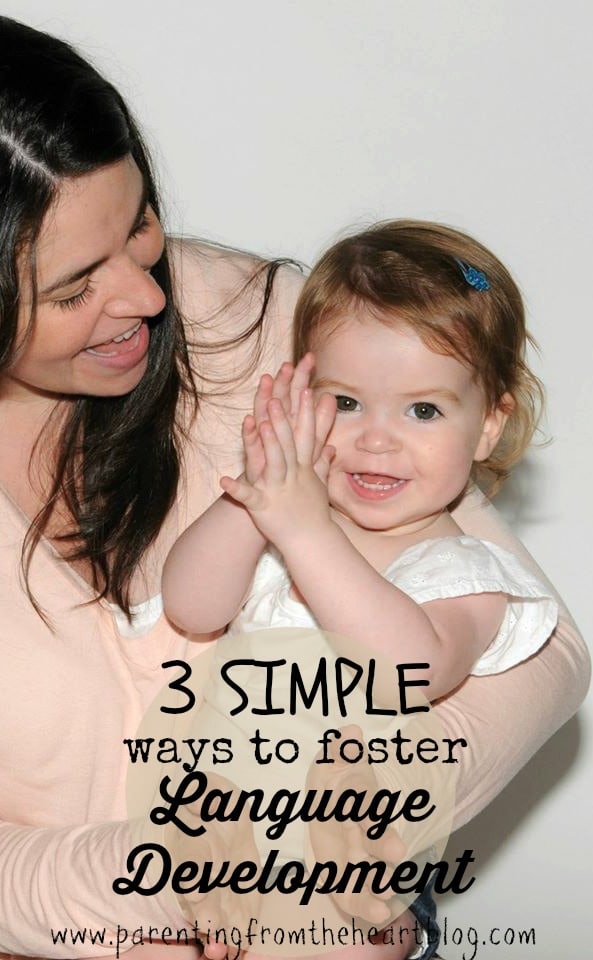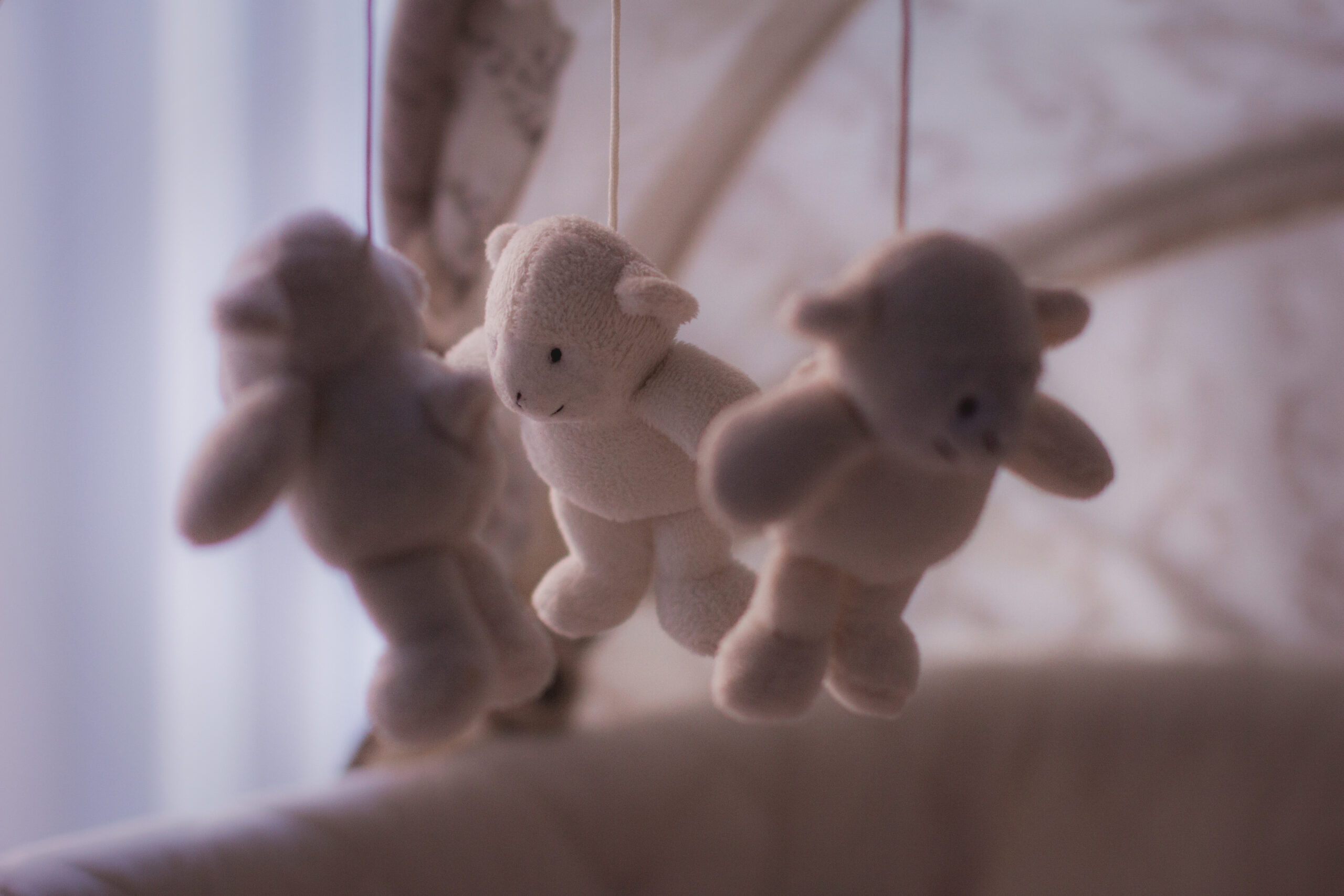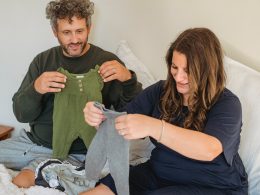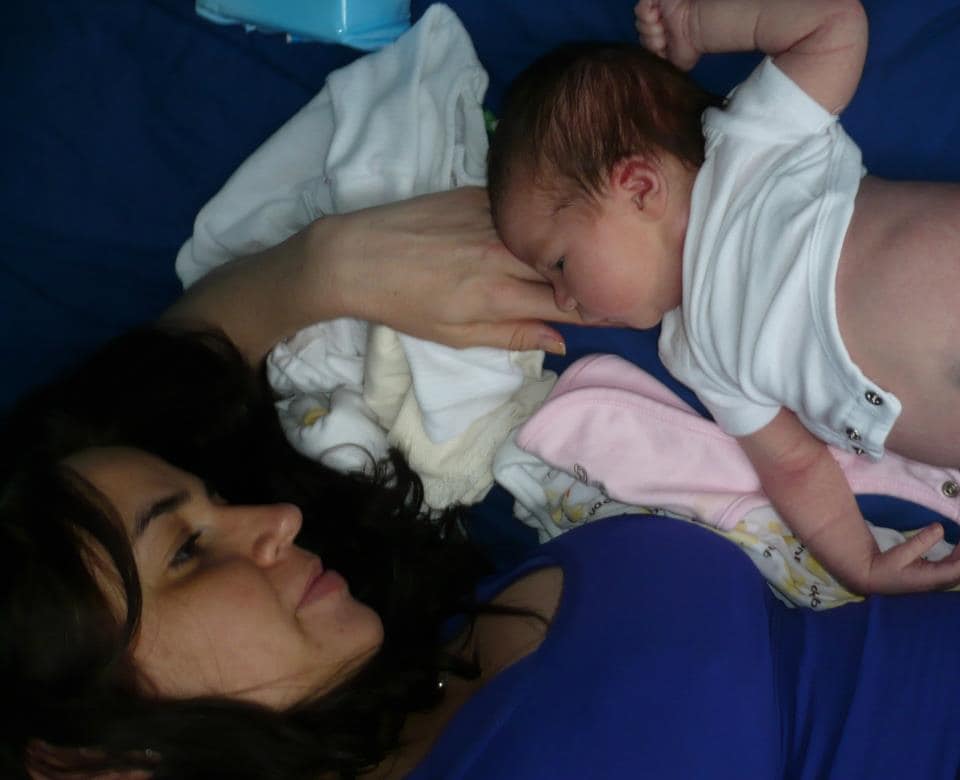Do you want to give your baby the best start linguistically? Check out these 3 research supported SIMPLE ways to foster language development in infants!
My university courses on child development were undoubtedly my favourite.
Of those, the courses on language development had me fascinated!
Before taking said courses, I had no idea that language development started before birth. The fact neonates (newborns) show a preference for both their mother’s language and voice is one of the most interesting things I’ve ever learnt.
In a nutshell, research shows that “the prenatal experience with the native language gained in utero influences how the newborn brain responds to language across brain regions sensitive to speech processing” (read more here). And, auditory stimuli during the third trimester create a preference for the maternal voice once the baby is born (see more here).
From birth, the baby is a sponge for sensory experience and language is one of the many things they are paying close attention to (even if it may not be particularly apparent). By 6 months, babies have begun turning their heads to see the source of sound or conversation. They can imitate sounds (I’ll never forget my daughter’s unrelenting desire to imitate people coughing!) and are making all sorts of babbling vowel sounds. By 9 months, they are making speech-like babbles combining consonants and syllables, playing games like peekaboo and waving b-bye. It’s by this time, there is no denying infants are social little beings. And while the language development process is innate, there are so many things you can do to give your baby the best linguistic start possible. Here are 3 simple ways to foster language development in infants.
3 SIMPLE Ways to Foster Language Development in Infants

1. Talk A LOT.
From the moment they’re born, talk often. Narrate what you’re doing, what they’re doing, how they’re feeling, what they’re attending to, what you think they’re wondering. I remember being at an early childhood program for babies and toddlers. The early childhood facilitator was asked by a mom why her almost two-year-old wasn’t talking. The facilitator was upfront, “I notice when you’re here, you don’t really talk to your daughter.” “She’s just painting and doing crafts,” the mom admitted. “Comment on the colours, the brush stroke. She can learn ‘up and down’ from what you say just on how she paints. She can learn opposites like, ‘a lot’ or ‘a little’.” The simplest activities hold boundless lessons for your child. When they’re pre-linguistic, Don’t. Stop. Talking.
2. Turn take.
This may seem a bit peculiar with a baby. But by the time they’re babbling, responding to their babbles is an invaluable way to promote language development. Ask questions and wait for a babble back. Then respond again. Research shows that caregivers responses to babies pre-linguistic babbles provide “crucial, real-time guidance to the development of prelinguistic vocalizations” (Goldstein & Schwade). Studies have found that infants who received any additional feedback from their caregivers babbled more than those that didn’t. One study found that nine-and-a-half-month-olds whose caregivers language reflected the experiences and output of the babies lead to more varied and elaborate babbling. More verbose babbling is a predictor of more advanced language development.
[Related reading: How to Promote Language Development in Toddlers]
3. Read, sing, and say nursery rhymes.
All of these mediums are proven to lead to greater:
- phonological awareness and auditory discrimination – it helps infants and children alike discern between different sound properties,
- greater vocabulary development – they’re learning new words through stories, song a rhyme, and
- auditory memory – they hear information, process it, retain it, and then later remember it.
Read more about this here.
No matter how wonderfully rich the linguistic environment of your child is, every child develops at their own rate. Both of my kids have amazing language abilities, but my son’s first year was spent with very minimal babbling and linguistic output. Don’t beat yourself up if your child’s language output isn’t that of his or her peers. Do your best and if you feel concerned, talk to your pediatrician or family doctor.
For additional reading
- Check out these linguistic markers by age.
- Check out my tips on promoting language development in toddlers!












These are such important tips. I also love evidence-based research – nerds unite! Ha! All of these are consistent with what I’ve read as well. These simple things have huge benefits that have lasting effects on language into adulthood! Well done!
Nerds unite is right. I could spend way too much time pouring over educational and psychological research. Love love love it too much! Thanks for your comment ❤️❤️❤️
Language is amazing!!!! My youngest is almost 9 months and is in The babbling big time phase- just like you mentioned she loves when you “talk” back to her and she gets extra chatty 🙂 it’s so cute!
My mom always told me that I was an early talker because she talked to me ALL the time. That always stuck with me, so I have been yapping to my kids since they were born! Also I never talk to them in baby talk.. I always use adult words, even if they arent sure what they mean.
Great post! As someone who has a speech delayed child Ughhh…. I’m convinced kiddos just learn when they are ready. I read all the books, was ridiculous when it came to things like this and haha… Yeah… I have the kid who has the delay. My good friends always joke with me because I am the ridiculous parent and look what happens lol… I will say now that my daughter is older and more aware of what’s going on around her, turn take is huge 😉 That’s the only way some days we can get my daughter to speak full sentences. We will have her fill in the blanks and all of a sudden it’s a “game” and she speaks.
Encouraging early language skills is so important. Wonderful tips!
Yes! Great post. Our sons’ pediatrician was the first person who encouraged us (in the hospital) to just keep talking. He told us to narrate everything we were doing (his words were, “give the play by play”) until it became second nature. And it actually became second nature fairly quickly. I recall a time we were at a doctor’s appointment for Joel and I was sitting in the waiting room with Caleb who was maybe a year and a half and he asked me, “Where did daddy go?” and I responded, “Daddy had to go have his blood drawn so they could run some tests to see what happened to his head.” when an older lady sitting next to me said outright, “He has no idea what you are saying to him.” I’m not typically one to respond quickly when faced with confrontation but I responded to her, “He may not today, but someday he will. His dad’s epilepsy isn’t going anywhere.” and it caught her off guard. That was when I realized just how second nature my narrations had become. My vocabulary may not be extensive and his verbal skills may not be exemplary by anybody else’s standards, but I have seen first hand how much kids pick up. Caleb repeats everything we say and with every new day comes a whole slew of words I didn’t know he knew. And it’s an incredible phase to be a part of.
Love this, especially since we are currently going through this right now. I love having conversations with E and watching for him look around room for me if I am talking.
I think talking around and to my son a lot helped him to have a large vocabulary. Of course, yesterday, maybe we said too much. He dropped something and “Damn It!” slipped right out of his mouth like it was nothing. Mommy oops!